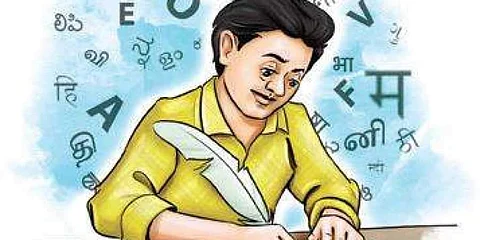

Jawaharlal Nehru University is scheduled to have its 151st Academic Council meeting on June 28 and the agenda of the meeting is — Hindi Imposition. The JNU Student Union and JNU's SFI have stated that the administration is planning to implement the proposal to make Hindi compulsory, at the upcoming meeting.
In October 2018, the MHRD and the UGC released a letter stating that all central universities must have Hindi as a compulsory language since it was the 'national language'. The proposal item said that the agenda is in response to the aforementioned letter — in which it has been requested that along with making Hindi a compulsory subject in all the schools and universities of India appropriate and necessary action should be taken to encourage the usages of Hindi in the Government Offices as well.
Only recently, there was an uproar across the country when the National Education Policy draft implied that Hindi would be made compulsory in schools. The MHRD issued a clarification after it came under lots of pressure. In this case, too, the JNU students say there's no way that they would allow Hindi to be made compulsory for the BA and BTech students.
The BA courses that JNU currently offers are all language degrees — Arabic, French, Chinese, Russian, Spanish, Japanese, German, Persian, Pashto and Korean. Therefore, students from across the country come to study at the University. The fact that it is also the top central university in the country and offers scholarships for students from marginalised backgrounds is another reason why students from even the remotest of villages choose to go the JNU. Bringing in Hindi as a compulsory language will disadvantage all these students, the Union and political student groups believe.
"This is just a backhanded method used by Modi, the RSS along with the VC to push the Hindi agenda on the students here. The government has no right to push any language on us, there are a large number of students who come from non-Hindi speaking states. The letter calls Hindi our national language when it isn't and I'm surprised our VC who is Telugu is okay with this Hindi imposition," Sai Balaji, the JNUSU President said.
In a melting pot like JNU, it is irrational to bring in Hindi as a mandatory subject, the students feel. Arunkumar S, a PhD student from the Tamil department in JNU said that the University already has a Linguistic Empowerment Cell where students who are weak in English can get extra classes and they also teach sign language and basic Hindi to students from other non-Hindi speaking states. "The Hindi course does help students learn some basic Hindi because we are in a Hindi speaking state and it helps to know the basics because we live here. So we are already learning it, so I don't see any reason to impose the language for the BA students," he said.
Arunkumar hopes that other state government and parties from non-Hindi state like the DMK to support their anti-Hindi imposition stand. "But we have to keep having these protests over and over and over again. It's the same thing every few years, something more permanent has to be done," he said. He points out that the problem is in the fundamentals itself — the fact that Hindi is a primary official language in the constitution. "The people demanding Hindi imposition find it easy to do so because they are constitutionally protected. Article 15(1) of the Constitution says that the state shall not discriminate on the grounds of religion, race, caste, sex, birthplace, residence — but it doesn't mention language. That's why the government is able to push such rules on us and discriminate on the basis of language," Arun said.
Arun points out that when the anti-Hindi agitation of 1965 took place in Tamil Nadu, the protestors succeeded in making English continue as an associate official language but Hindi remained the primary official language, "But the only permanent solution is to give equal status to all languages in the eight schedule, not just Hindi," he said.
By implementing Hindi as a mandatory subject even at the basic level, the scholar said it could put non-Hindi speaking students at a disadvantage. "Those who come from Hindi speaking states will have the upper hand and if advanced Hindi is taught then how can a non-Hindi student who has no previous knowledge of the language suddenly be able to learn so fast. They will be at a great disadvantage," he added.
It has been a while since the JNUSU has been allowed to attend the academic council meetings. It is only after they went to court with the matter, that the JNU administration has opened its doors to the Union again. They have systematically been kept out of various other decision-making bodies too. But this time, the JNUSU President says the administration's agenda is in direct violation of the constitution and people's rights, "They have to drop the agenda or they will have to face the music," he said.
